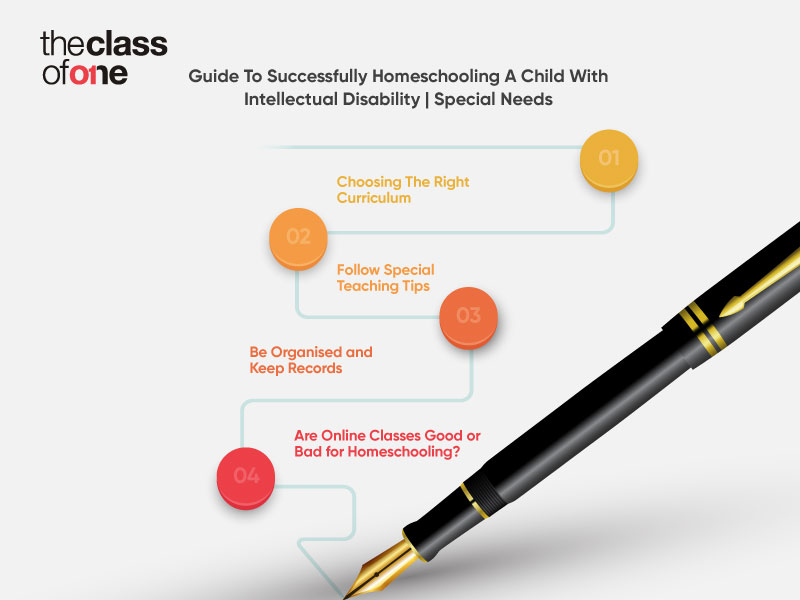
Homeschooling is often the option parents choose for a child with an intellectual disability. While there are traditional schools that promise to give a special-needs child all the required attention, sadly these promises fall short – if not for lack of will then for lack of resources. Their facilities get overcrowded, the teachers get overburdened, and in the end, it’s your child that bears the brunt of this failure.
Homeschooling, however, is a brave undertaking. Schools come with a structure – a set of rules, regulations, and teachers who supervise, discipline and help the children learn. With homeschooling, parents will need a number of things to effectively educate their children while keeping their special needs in mind.
In this blog we discuss a few of those things:

Choosing the Right Curriculum
It’s a tricky business to handpick the right courses for your child that not only match the child’s needs but also incorporate all the necessary courses that are required by your state, if any. Be sure to go through your state’s laws and requirements for homeschooling before selecting the courses.
After you’ve chosen the appropriate curriculum, consider your teaching style and what would work best for your child. You might want to keep in mind that your child might love studying on computer devices, but that doesn’t mean that you should insist on computer-science subjects.
A good practice is to understand your child’s comprehension level of the material you’re teaching. This is so that you’re able to teach them on their cognitive level, and not according to the perceived standard at their age. Take some pretests and get baseline scores so that you have an idea where your child stands academically, and how you should go forward with their education.
Some Teaching Tips
Flashcards especially work well with fidgety kids. It’s a quick and easy way to help the kid master what they’re learning, the flashcards would include images and words to help them retain them in their visual memory.
Creating dance moves along with songs that incorporate facts in their lyrics is a fun and effective way to help your child learn and stay active at the same time.
Story walks are a very effective way to practice speech and language. One person thinks up of a few elements that would be in the story and the other uses those elements to tell the story. This exercise can also be used to quiz your child on vocabulary and on information related to the story to test their comprehension.
A chalkboard would be a wonderful addition to the teaching space that would give your child a sensory outlet to express themselves.
When you’re busy with other tasks, Audiobooks work to save your time and keep your child engaged with stories and educational songs.
Be Organised and Keep Records
Record-keeping might sound like a daunting task but, frankly, it’s easier than it seems and it’ll make homeschooling so much more efficient. All you have to do is take some time out to do some research and know exactly what you’ll need to make this endeavour a success. Look into your state and local homeschooling laws and make a note of everything necessary to be in line with them.
Aside from general things like grades and progress reports, you’ll also need to consider a couple of other things like diagnostic reports from therapists and analytics on behavioural and cognitive progress. Along with all these you should also maintain your own records personalised for your child.
Fortunately, most of these can be tracked easily using the Individualized Education Plan (IEP). It’ll help you track all the important information you need and the document can also serve as a useful tool to advocate for your child’s needs outside of the homeschool environment. There are many IEP templates available on the internet for download or you can take them as a reference to create your own.
While working with progress reports, be sure to keep your window of evaluation broad – up to nine to twelve months. Shorter windows could result in misevaluation of your child’s progress and misinterpret your child’s learning curve. Also, do not compare your child’s progress against a same-age peer group or against any other child. Your child’s progress will be unique and needs to be considered individually.
Are Online Classes Good or Bad for Homeschooling?
Some parents who are too busy with work usually opt for online schools. For instance an online school in India called Class of One provides parents with dedicated teachers who give each child individual attention. They have all the necessary curriculums that’ll help you school your child at home without any hassles.
Whether online education could prove beneficial for a child with an intellectual disability depends on the kind of intellectual disability. Some conditions require more attention and physical one-to-one sessions with the child, while others don’t require as much attention. Looking for guidance? Talk to our counsellor.
A homeschooling program for a child with an intellectual disability involves selecting board-recognised curricula tailored for special needs. These curricula are designed to provide equal opportunities for a bright future. By focusing on recognised educational standards, children with special needs can receive a quality education that prepares them for success, ensuring they have the same opportunities as their peers.
Homeschooling in India for a child with special needs transforms the home into a nurturing learning environment. The absence of travel and discomfort ensures a personalised and supportive setting. Schools customise the curriculum to address the child's unique needs, enabling them to learn beyond their disabilities. This approach ensures that children with special needs receive an education that puts them on par with their peers, fostering an inclusive and empowering learning experience.
Yes, homeschooling offers special education for intellectual disability by tailoring the curriculum to address specific needs. Creative teaching methods, such as flashcards, dance moves, and story walks, prove effective for children with intellectual disabilities. Personalised record-keeping, including diagnostic reports and progress analytics, enhances the overall learning environment.
Graduating a homeschooler with intellectual disability involves maintaining organised records, including progress reports and diagnostic evaluations. An Individualized Education Plan (IEP) serves as a valuable tool to track essential information and advocate for the child's needs. Consideration of the child's progress individually, without comparisons to same-age peer groups, ensures a supportive and unique learning journey.